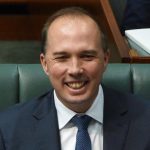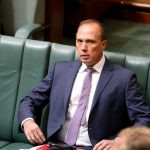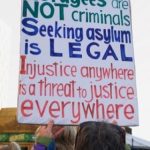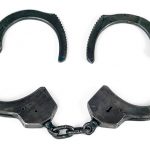Defending the Nauru 19: An Interview with Sydney Lawyer Christian Hearn
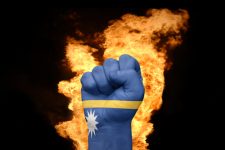
Nineteen people from the island of Nauru are facing trial accused of public order offences following a protest against the Nauruan government on June 16 2015. Now known as the Nauru 19, the group were part of hundreds of locals who’d gathered to demonstrate.
The protesters were making their way to Nauru parliament house to hold a peaceful rally, when they were confronted by police. The situation escalated as officers tried to disrupt the protest using newly enacted public gathering laws.
Following the ensuing scuffle, some of the members of the Nauru 19 were arrested on the spot, while the rest, including former president of Nauru Sprent Dabwido, had warrants issued for their arrest.
Removing the opposition
The protesters were calling on the Waqa government to resign over its decision to suspend five opposition MPs from parliament for an indefinite period of time. The removal of five parliamentarians was significant, as the parliament of Nauru only has 19 members.
Initially, three members of the opposition were suspended for criticising the government in the foreign press in May 2014. A further two MPs – former president Dabwido and Squire Jeremiah – were suspended the next month for behaving in an “unruly manner.”
Dismissing the judiciary
But the trouble really began when the government of Nauru decided to dismiss the leaders of its judiciary, in a move that was internationally condemned as a violation of the rule of law.
In January 2014, Nauru’s president Baron Waqa fired the nation’s Chief Magistrate Peter Law and ordered the Australian to leave the country.
Nauru’s Chief Justice at the time, Geoffrey Eames, intervened by issuing an injunction to stop the deportation. However, the government responded by cancelling Mr Eames’ visa and barring him from re-entering the country.
An Australian defence team
The Nauru 19 were refused legal representation by the Nauruan Public Defender, and there were no other lawyers on the island to defend them. That’s when a group of Sydney-based lawyers stepped in to represent them on a pro bono basis.
Defence lawyer Christian Hearn is representing the accused, alongside counsel Mark Higgins, Stephen Lawrence, Felicity Graham and Neal Funnell. The team are currently battling the difficulties of representing such a large group on a far-off island with little access to internet communications.
Three of the Nauru 19 initially plead guilty to public order charges, and are set to appeal their sentences to the High Court of Australia. Bret Walker SC has offered his services to these men on a pro bono basis.
Contributing to justice
The lawyers are currently running a crowdfunding campaign to cover the steep costs involved in flying to Nauru, along with all the other expenses involved in running a case that has dragged on for much longer than was expected.
Sydney Criminal Lawyers® spoke with Christian Hearn, principal solicitor at Hearn Legal, about the ousting of the judiciary and opposition members, the court proceedings so far, and the struggle of representing people on a remote Pacific Island.
Firstly, Christian, the situation that sees your legal team defending the people who’ve become known as the Nauru 19 hearkens back to early 2014, when then Nauruan Chief Magistrate Peter Law and Chief Justice Geoffrey Eames were sacked by the Waqa government.
What led the government to sack the country’s judicial leaders?
Precisely what was going on in their minds, I do not know. But, we know that immediately before Peter Law was deported. He had issued an injunction against the deportation of another person: a local businessman by the name of Rod Henshaw. The granting of that injunction displeased the executive. And we know that his deportation followed after the issuing of that injunction.
We also know that the cancellation of the visa of then Chief Justice Geoffrey Eames followed very shortly after he…granted an injunction against the deportation of Magistrate Law.
You could take the view that the deportation of Magistrate Law and the cancellation of the visa of Chief Justice Geoffrey Eames came about because they made decisions that displeased the executive.
In May 2014, a total of five opposition MPs were suspended from parliament. Why were these parliamentarians suspended for what turned out to be an indefinite time?
The suspensions are more accurately described in a practical sense as expulsions.
Following the deportation of Peter Law and the cancellation of the visa of Chief Justice Geoffrey Eames, a number of members in parliament, who were then sitting in opposition, made comments to both the New Zealand and Australian media, which were critical of the government and expressed concerns about the breakdown of the rule of law.
The suspensions, as they were termed, came about as a result of them having made those comments.
The standing orders of the Nauruan parliament allow suspensions from parliament for finite periods, not extending beyond three individual sittings.
Prior to the suspension of the first three members of parliament – Mathew Batsiua, Roland Kun, and Kieren Keke – the then justice and immigration minister David Adeang moved a motion to suspend the standing orders, which placed the limitation on the period for which somebody could be suspended.
Once those standing orders had been suspended, he then moved a motion for suspension. And the practical effect of that suspension was an expulsion – that is until the end of that term of parliament.
On June 16 2015, hundreds turned out to protest the MPs expulsion from the Nauruan parliament. What transpired at that event?
I won’t comment on what happened during the protest, because that is before the court. But, I can tell you what took place on the morning of that protest, before things got out of hand.
The group of people who joined in the protest were a number of MPs, who’d been suspended or de facto expelled from parliament, and hundreds of their supporters. Those people had been essentially disenfranchised for twelve months. They had not been able to participate in the political life of their country from the time of the suspension of the MPs to the time of the protest.
The day on which they chose to protest was an important day. It was the day that the budget was going to be passed. And these people wanted to have their representatives in parliament to ensure that the resources of the state were allocated in a way that didn’t ignore them.
The plan was to travel to parliament to hold a peaceful protest. And to that end, they put together placards, billboards and signs. And they went in convoys – walking, motorbikes, cars and trucks – towards parliament.
When they got within about 200 metres of the parliament building, they encountered a police roadblock. And the police stopped them from proceeding any further, citing a newly enacted law banning congregations of three or more people.
So, these people were not only prevented from participating in the political life of their country for over 12 months. But, when they sought to protest against their exclusion, they found that they were then prevented from doing so by this new law.
It was at that point only, when they were prevented from holding their peaceful protest, that things got a little out of hand.
That event resulted in the arrests of the Nauru 19. They appeared in court in November that year on public order charges and most of them pleaded not guilty.
However, three of the men – John Jeremiah, Josh Kepae, and Job Cecil – pleaded guilty. What happened to them?
There were actually four people that pleaded guilty. There were three men and one woman.
The four that pleaded guilty did so in front of then Resident Magistrate Emma Garo from the Solomon Islands. We conducted sentence proceedings in front of her. Two of the men received three month gaol terms and one of the men received a six month gaol term. The female defendant received a suspended three month gaol term.
The three who were sentenced to gaol then appealed, and sought to be released on bail. They were released from gaol on the same day that they were sentenced.
Having noted our intention to appeal, the DPP of Nauru then also filed an appeal against the leniency of those sentences. So, our appeal and the DPP’s appeal ended up being heard in the Supreme Court of Nauru in front of Acting Chief Justice Mohammed Shafi Khan.
On appeal, we were obviously seeking lower sentences, and seeking community based sentences, for the three who were sentenced to gaol. The DPP was urging significantly heavier penalties than those that had been imposed in the District Court before Magistrate Garo.
The outcome was that the sentences against each of the three were dramatically increased. In one instance, from the three month fixed term sentence to a 22 month gaol term.
These three men who were sentenced to prison are now going to appeal that decision in the High Court of Australia.
When is this case going to take place? And I have to ask, why is it set to take place in the Australian High Court?
We have a tentative date for 20 October and that will not be for the appeal itself. That is for the application for leave to appeal, which is the first hurdle. Bret Walker has kindly agreed to appear pro bono in that matter.
The reason it’s taking place in the Australian High Court is that the High Court is the highest court of appeal for Nauru. And that’s simply because there is a legislative framework for that to be the case. It’s not dissimilar to arrangements whereby Australia and New Zealand have had their highest court of appeal as the Privy Council.
Now the remaining 16 defendants, which includes former Nauru president Sprent Dabwido and former justice minister Mathew Batsiua, are being represented pro bono by yourself and four other Australian lawyers in Nauru.
How difficult is this case considering the political situation in Nauru at present?
It is difficult for all sorts of reasons. It’s difficult simply because of the number of people involved. And it’s difficult because of the language barrier. Some of our clients have Australian private school educations, but others barely speak a word of English.
It’s also difficult because of the distance, and there’s really no internet access over there. You can send emails, but you can’t have a conversation over a social media application. So, communicating with our clients is very difficult, and we can only really have meaningful communication when we’re on the island and in their presence for people to interpret.
So there’s those logistical difficulties.
The political environment in which it is taking place also very significantly complicates things. One of our initial applications before the District Court was for stay of proceedings on the basis that they could not get a fair trial before the court in Nauru at the time.
But, things are evolving. At present, the matter has been removed to the Supreme Court for trial to begin again. Ashurt Australia has been engaged by the Nauruan government to take over the prosecution. And there is also been approval for a retired Australian judge to preside over the matter.
So, the political context has been very complicating, but there are some positive signs more recently.
How would you describe the state of Nauru’s judiciary under the Waqa government today?
Given there has been executive powers used in the past to remove judicial officers – and when I say remove, not removed by parliamentary process, but to remove by the use of immigration powers – there is a real concern that the executive holds too much influence over the judiciary.
And lastly, you’re currently running a crowdfunding campaign to cover your expenses. How difficult is it to fund this ongoing legal battle when you’re working pro bono in another country?
Very. When approached by several of our clients almost 2 years ago, the Public Defenders office of Nauru refused to provide representation. At no point has the Government of Nauru contributed a cent to the defence or provided them any assistance to obtain legal representation.
The clients originally were doing a lot of the fund raising themselves. And I think nobody could have predicted just how complex and drawn out this was going to be.
They had their own online fundraising campaign, which pulled in a bit of money. After that, they were basically door knocking. And you’ve got to remember, most people in Nauru are of relatively limited means. So, they were relying on neighbours, supporters, family members and the like to donate small bits of money and thereby fund our travel to and from the island.
With the passage of time, there has been fatigue amongst those supporters. They’re not losing interest, but they are losing the financial ability to actually provide meaningful support.
So, the cost of travel, accommodation, and all the attendant costs to running a criminal trial have been falling to the representative.
The fundraising campaign that we held last Friday, drew in about $13,000, which is good, but it is really a drop in the ocean.
Every time, each of us travels there it is $2,000 for the airfares between Brisbane and Nauru alone. So, if we go at full complement, we are talking $10,000 for a return trip, before we even talk about hotels, accommodation, connecting flights and the like.
Christian thanks very much for taking the time out to have this chat with us today.
Thank you.


